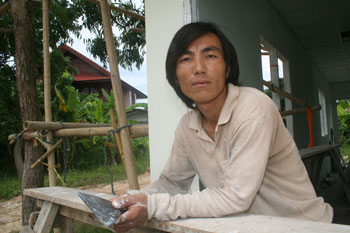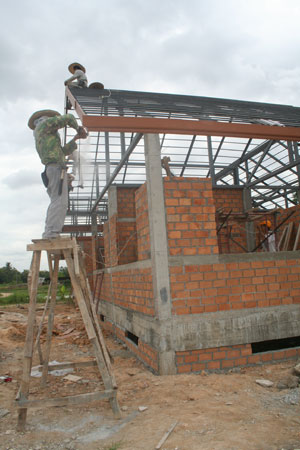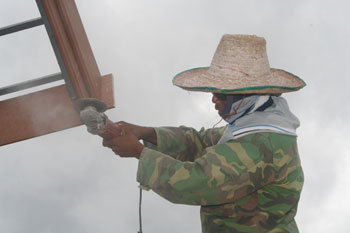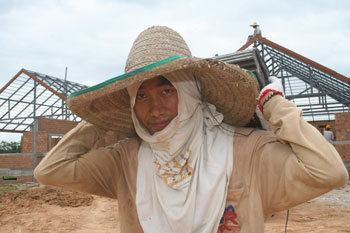 Chiang Mai - Like many of the nearly 1.5 million illegal Burmese migrant workers employed in Thailand, 27 year old construction worker, Naw Naw, from Kachin State, is trying to make sense of a new labor law which has now come into effect in Thailand.
Chiang Mai - Like many of the nearly 1.5 million illegal Burmese migrant workers employed in Thailand, 27 year old construction worker, Naw Naw, from Kachin State, is trying to make sense of a new labor law which has now come into effect in Thailand.
Although he is a registered worker, he doesn’t plan to return to Burma for documentation under the new regulations and may find himself arrested and deported in a crackdown on illegal workers Thai authorities promise will start very soon.
The Thai Government passed a resolution on May 26th of this year which provides for the registration of Burmese migrant workers, who will be allowed to work in Thailand temporarily if they complete a three step process.
The first step was to apply for a registration document at a municipal office, by July 31th, using an approval form signed by their employer.
Next, they are required to receive a medical check-up, before August 14th and purchase health insurance from the Ministry of Public Health.
 Only after completing these two steps can the worker apply for the work permit at Provincial Employment Offices and at the Employment Office in Bangkok.
Only after completing these two steps can the worker apply for the work permit at Provincial Employment Offices and at the Employment Office in Bangkok.
Naw Naw, who works as a painter, had a valid worker registration card which expired in 2007 and has registered again by the July 31, 2009 deadline.
But, he is concerned that his new work permit is only effective until February 28, 2010.
Then all Burmese workers will be required to return to Burma to obtain documentation from their own government proving their citizenship under a new National Verification Process.
Another construction worker, from Shan State, said in an interview he opposes the verification process because he believes personal information such as family name, identification number and his address inside Burma could be used by Burmese authorities to harass and extort money from family members, because the migrant workers are considered to be out of their country illegally.
Sai Hom Khurh said, “I don’t want to harm my family by me registering here. If the Thai government does not change the law, more harassment will come to us.”
Many workers also fear repercussions because they don’t have valid identification documents needed to be approved for verification.
Some labor activists and human rights advocates share Sai Hom Khurh’s fears.
Htoo Chit, of the Grass Roots Human Rights Education Foundation, said in an interview he actually encouraged workers to register for the work permit because it would mean better pay and working conditions.
But, he does not endorse the National Verification Process, saying, “The majority of workers would not dare to sign up for the verification process.”
He said, “There are few who would go back. I don’t think the process would be successful.”
Moe Swe, of the Yaung Chi Oo Migrant Workers Group, also does not advocate participation in the National Verification and doubts many workers will get involved.
 He alleges Burmese authorities extorted money in the past from worker’s families in Pa-An, capital of Karen State, who were working in Bangkok.
He alleges Burmese authorities extorted money in the past from worker’s families in Pa-An, capital of Karen State, who were working in Bangkok.
“I see little prospect for success in the process,” he said in an interview. “The Thai government should reconsider. The Thais can’t go without Burmese labor.”
But, Burmese authorities have suggested these fears are unfounded.
In July, Burma’s Deputy foreign Minister, Maung Myint, said during an interview families of workers will not be harassed. That was during a meeting with Thailand’s Labor Minister.
“The government will never do so because it believes that people working in Thailand are good people and their jobs are also legal,” he said.
Passport issuing offices were opened along the Thai/Burma border at Myawaddy, Tachilek and Kawthung (Victoria Point).
The Thai government will charge a visa fee of 2,000 Bhat per person. Burmese workers granted passports will be allowed to work in Thailand for another two years and apply for an additional two year extension.
So, at least one migrant worker group sees potential benefits to workers for participating in the process.
Sai Seangmuang Mangkorn is secretary of the Migrant Assistance Program. He said in an interview Burmese workers will have the protection of similar rights to Thai workers, will have freedom to travel in Thailand and will be eligible to apply for a driver’s license.
 And, he said Burmese workers will be able to earn the same wages as Thai workers.
And, he said Burmese workers will be able to earn the same wages as Thai workers.
“The best way is if a (Burmese) worker follows the law.”
Some Thai business owners also see benefits, both for the workers and employers.
The owner of Technology Lacha Mong Khon, a construction company in Doi Saket which employs 45 Burmese workers said in an interview granting workers legal status is good for business.
“They won’t need to fear for police arrest anymore,” he said, asking not to be identified.
“I will be free from worrying they will be arrested by Thai police. Employers want legal workers.”
But, some workers say they are confident they will still find work despite Thai authority’s insistence they will deal severely with workers and employers who do not comply with the new regulations.
If Naw Naw doesn’t return to Burma for verification of citizenship he will not be able to continue working in Thailand legally.
But, that is a risk he is willing to take.
“There are a lot of places I can continue to work without a permit. I am not worried about that,” he said.
“It is not rational to go back to Burma. If I don’t have a work permit, I have to find a way to survive under the new situation. I can work illegally.”



